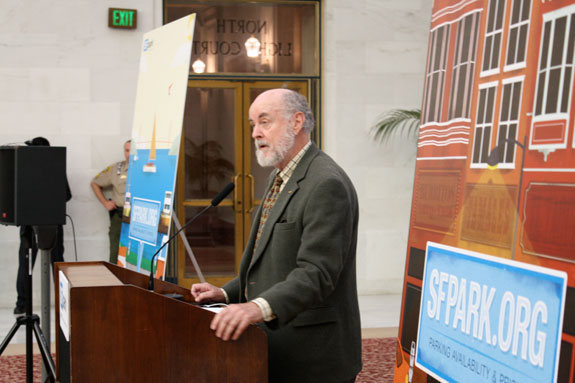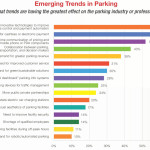Donald Shoup, world renowned economist and researcher, will be speaking at the Mercantile Library on October 28.
For those unfamiliar with his work, he is a forerunner in examining the effects of parking policy on urban economics, which he presented in his 2005 book The High Cost of Free Parking. The book was preceded by an article of the same name, which Shoup wrote in 1997.
Mandated parking requirements, it seemed, was an issue that many planners felt ill-equipped to tackle. It had not been lectured on in their classes, and textbooks were often silent on the matter. And according to the American Planning Association, planners requested information on this topic more than any other.
Mandated minimum parking requirements have been a zoning code staple since the widespread adoption of the automobile. For example, a zoning code may require that apartment buildings supply one parking space per unit, or that a restaurant provide one parking space for every 300 square feet of space used by patrons. While parking minimums are typically set by the use of a property, they vary based on what kind of zoning district the property is found in – for example, a low density, auto-oriented district will require more spaces than a dense area that is more walkable.
As planners wrote their zoning codes, they had few tools at their disposal to discern where they should set their parking minimums, which led to the common practice of borrowing numbers used by other cities that often did not account for local conditions. And as Shoup found, even if planners could observe capacities and usage for, say an office building, not every office building was created equal. An office building that allowed employees their own offices instead of cubicles would have fewer employees per square foot and therefore should conversely be assigned a lower parking spot minimum.
And since minimums were based on the maximum capacity for a particular use, an additional quandary arose from requiring parking that would very certainly sit unused most of the time.
Upon examination of the issue, the numbers used to set minimum parking requirements were considered arbitrary – a best guess, and applied with broad brushstrokes. Therefore, Shoup set out to examine where and how the cost of this imposition on property development was being absorbed.
Analyses were able to estimate how much development costs increase due to parking minimums, and the results bred a new understanding of how parking requirements can increase the cost of real estate, particularly in urban areas. A portion of these costs are presumably passed on to tenants and patrons, regardless of whether they own a car and utilize a parking space.
When applied to denser historic districts built before the automobile, lots frequently are not large enough to provide the amount of spaces that a zoning code may require for parking. The result is a tangible barrier to redevelopment, revitalization and the adaptive reuse of buildings.
Brian Bertha, a researcher in California, analyzed project costs before and after the establishment of parking minimums in 1961 in Oakland. He found that after the requirements were put in place, construction costs per dwelling unit increased 18%, housing density fell by 30%, and land values decreased by 33%.
In Shoup’s research he speculates that if “emancipated from minimum parking requirements, land and capital will shift from parking to uses that employ more workers and pay more taxes.”
Instead he advocates making parking a pay-per use amenity, and thus encourage greater use of public and active transportation. Furthermore, he believes that revenues generated from on-street parking be utilized within neighborhood improvement districts in order to provide more amenities in those districts.
Just as we are taught in economics class that “there’s no such thing as a free lunch,” Shoup uses his skill for economic analysis to illustrate that there’s no such thing as a free parking space.
Driving is still necessary for ease of accessing employment in most American cities, but Shoup’s analysis allows policy makers to think critically about the interconnectedness of these policies, and the role that a thoughtful approach can play in reducing congestion, decreasing auto-dependence, and removing barriers to investment.
If you would like to attend Dr. Shoup’s lecture, he will be speaking downtown at 6pm at the Mercantile Library at 414 Walnut Street. Tickets can be purchased online for $10 for members and $15 for non-members.

